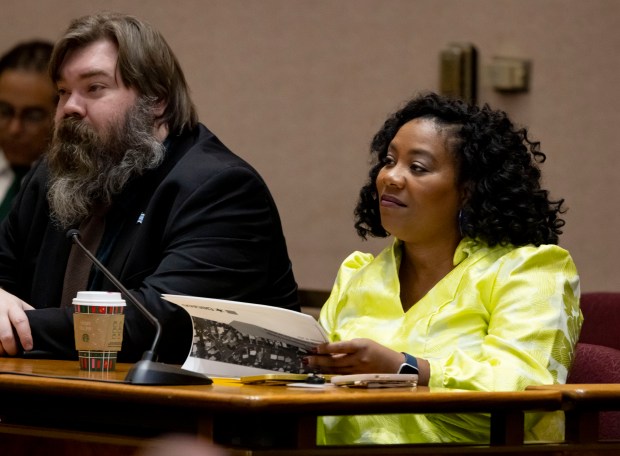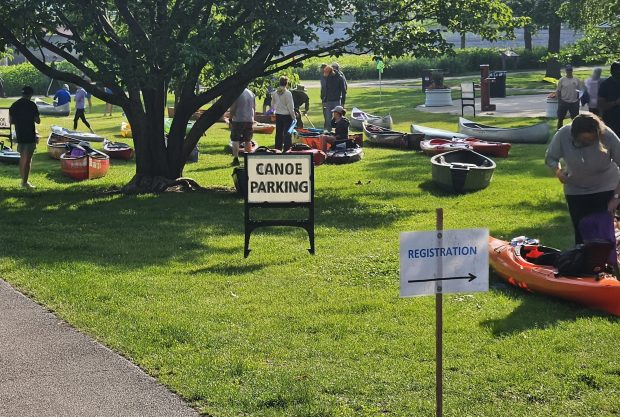Chicago aldermen seemed primed Wednesday to finally put some meat on Mayor Brandon Johnson’s charge that they come up with new revenue for the city to avoid a property tax increase.
After bold ideas for new taxes, fees and other moneymakers — from a “video gaming” gambling levy to Riverwalk billboards, a 1% grocery tax and more — had trickled out for weeks, the City Council Subcommittee on Revenue met for the first time.
But by the end of the long-awaited hearing, aldermen left City Hall with few answers on how additional funds might be raised. Instead, the early discussions centered mostly around municipal finance basics.
The intention had always been to set the ground for future debate as Johnson gets ready to introduce his 2025 budget, said the subcommittee’s first-term chair, Ald. William Hall.
“Going into the fall, we will be able to see more closely in depth if we can land the plane the way we want to,” Hall, 6th, told reporters afterward. “The goal today was simple: Let’s learn, then let’s grow.”
Hall called the initial hearing “the introduction we were waiting for” and promised individual proposals will be weighed “expeditiously.” But the lack of specifics left some aldermen frustrated.
“I’d tell you, if we had $10 for every platitude we heard in this chamber, we’d have a balanced budget,” said Ald. Brendan Reilly, 42nd.
The hearing began with a presentation from Johnson’s top budget officials that amounted to a crash course in Chicago’s funding sources.
Comptroller Chasse Rehwinkel and Budget Director Annette Guzman explained fundamentals like how the city splits Illinois income tax revenue with the state and charted the revenue that makes up the city’s primary spending fund. But despite the schooling, the experts had little to say regarding the question on everyone’s mind: Should taxes and fees in Chicago go up, and where?
Guzman described the flatlining future of city revenues as federal COVID-19 stimulus funds run dry and highlighted the broad ways in which budget bureaucrats typically vet proposed revenue policies. But she did not show her hand when asked about many specifics.
“We are looking at a variety of different approaches to revenue generation, not necessarily all of it being increases in taxes,” the budget director said. “We’re still doing a ton of research on options.”
Many of the 16 different revenue-raising ideas Hall shared in a survey sent to his City Council colleagues last week were not discussed throughout the meeting.
Aldermen and experts alike uttered a common refrain of calling on Illinois to give Chicago a larger cut of various state tax revenues, a politically challenging prospect the City Council and mayor ultimately have no legislative power over.
While the meeting was light on number-specific analysis, one eye-catching figure arose when Ald. Gilbert Villegas, 36th, asked about the potential of replacing the 1% statewide grocery tax dropped by Illinois lawmakers earlier this month with a local 1% grocery tax. The city currently receives between $60 million and $80 million from the soon-to-end tax, Guzman said.
Ald. David Moore, 17th, later pressed the budget director on the “dollar amount” that aldermen are trying to reach to balance the city’s budget.
“I don’t think it’s a dollar amount that we are trying to attain,” she said. “We are trying to create structural balance in our budget, right? And what that means is your expenditures are not increasing faster than your revenues are increasing.”
After the meeting, Guzman declined again to estimate the size of the city budget deficit. Johnson campaigned on the idea of adding $800 million in new taxes on “the ultrarich,” but has not yet advanced any proposals to do so.
Some aldermen re-upped the idea of legalizing and taxing “video-gaming” gambling machines. Another new proposal came from Ald. Mike Rodriguez, 22nd, who said the subcommittee should consider issuing automated fines on big-rig trucks that drive on and damage streets where they are not allowed.
Rodriguez urged the committee to not place new tax burdens “on the backs” of working-class Chicagoans before asking Hall to underline the subcommittee’s goal.
“The goal of the committee is to take ideas from this body and put it through this test,” Hall said, flashing a slide of framework keywords: authority, efficiency, equity, simplicity and transparency. “Everything counts and everything matters.”
Reilly blasted the subcommittee’s focus. The budget process should start with “efficiencies and cuts,” he said.
“I’m frustrated with this process, coming into this conversation saying, ‘Where are we going to find more money and who are we going to hit for it,’ without looking at are we wasting money,” he said.
jsheridan@chicagotribune.com




